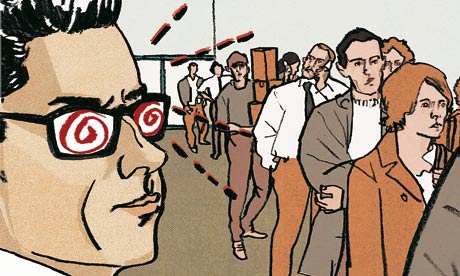
Life presents all too many situations in which we're forced to place our trust in people we've no particular reason to trust. The classic example is driving: you can buy the safest car available, and take all the advanced driving tests you like, but hitting the road is still ultimately a matter of entrusting your fate to hundreds of strangers – people who, by definition, you'd never leave your kids with, and who might, for all you know, be drunk, high, overtired, hallucinating, prone to uncontrollable violent outbursts, convinced they're immortal deities from alien planets, or just massively stupid.
Except for giving up driving, there's not much you can do about this. But it was only a few months back, heeding the urgings of several writers on productivity, that I came to realise that a somewhat analogous, if mercifully less lethal, situation pertained in many areas of my life – because I wasn't keeping a "waiting-for list".
The argument runs as follows: multiple times a day, at work or outside it, most of us make requests of people – underlings, superiors, friends, service providers – and simply assume they'll follow through. Even non-managers like me, whose work involves no formal delegation, "delegate" like this all the time: that's what's happening when you order a book from Amazon, ask a colleague for a piece of information or email a friend about your weekend plans. Yet based on an unscientific survey of my acquaintances, what proportion of people have a systematic way to keep track of who they're waiting to hear back from? Zero per cent, approximately. (I suspect the same problem infects entire organisations, too.) And though aficionados of David Allen's book Getting Things Done will be familiar with this issue, the vast majority of "productivity systems" are no help at all: they're fixated on helping you remember and prioritise your own tasks – even though, in truth, you're far less likely to forget about those.
It turns out that keeping a "waiting-for" list is like being handed a pair of x-ray spectacles for peering inside your colleagues' lives. Based on what does or doesn't get crossed off the list, as people do or don't get back to me, I'm pretty sure I now know who's on top of things, and who's inefficient or just lazy, their email inboxes backed up like clogged drains. (It's possible, I realise, that it's just me they're not responding to, out of icy contempt. I hope not.) The only downside is wondering how many loose ends I must have let slip before keeping the list: how many mail-order items ordered and never received, how many plans suggested to friends then abandoned, just because it slipped my mind that I'd ever asked?
There are risks here, to be sure. It wouldn't be hard to become a pestering bully, ceaselessly harassing people who don't respond to your emails within minutes. Just because you're aware of others' failure to follow up doesn't mean you need to act on it, and it may frequently be diplomatic, or just kind, to let things slide. (It may also be strategic: get too conspicuous at this, and people will soon stop tolerating your own lackadaisical response times.) Instead, simply luxuriate in the private, smug satisfaction of knowing you're more organised than other people. And isn't that, ultimately, the very definition of happiness?
Well, no, of course it's not. But it's still surprisingly fun.
oliver.burkeman@theguardian.com

